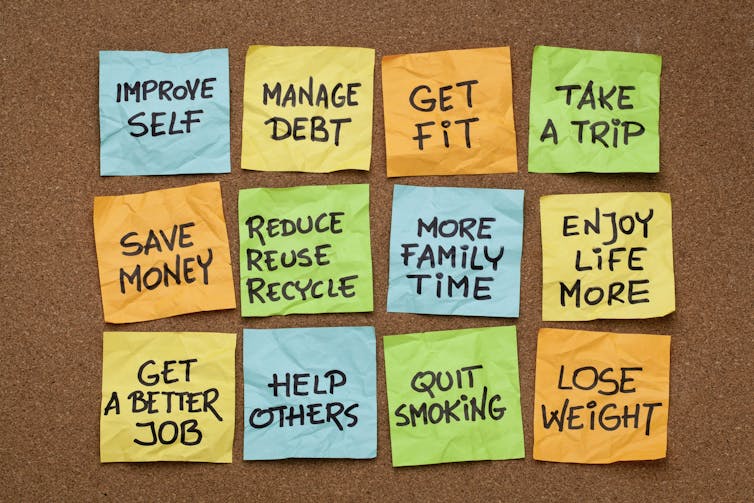9 tips to give yourself the best shot at sticking to new year's resolutions
- Written by Joanne Dickson, Associate Professor of Psychology, Edith Cowan University
For many cultures, the dawn of the new year is marked not only with celebration, but also the opportunity for personal reflection and growth.
But as the year progresses, our initial drive for self-betterment can falter.
The good news is our tendency to give up can be circumvented. There are various ways we can strengthen our commitment to our new year’s goals.
A mismatch between aim and actions
In early 2020, my colleagues and I surveyed 182 participants to study personal goal factors which promoted well-being and sustained people’s pursuit of their most important new year’s resolution.
We found 74% of participants listed their most important resolution as the same, or nearly the same, as in the previous year.
More than half of the resolutions focused on either “diet” (29%) or “exercise” (24%). This suggests health-related goals tend to get rebooted each year — perhaps because New Year’s Day follows plenty of end-of-year festivities and feasting.
Furthermore, despite the participants reporting a strong commitment to their listed resolution, about two thirds gave up within one month. Other studies have shown similarly high rates for not sticking with new year’s resolutions.
Read more: Symbolic gestures, magical thinking: New Year's resolutions
Generating meaning to sustain effort
If you’re wanting to set yourself a resolution for 2021, a good place to start is to reflect on the year that was.
Our personal reflection on 2020, and the key lessons we took away from it, will help determine our hopes and visions for the year ahead.
Due to the coronavirus pandemic, 2020 was marked by prolonged lockdowns, isolation, loss and shifts in opportunity. But personal growth and strength can stem from such experiences, as past research has revealed.
Living though difficult and stressful times can pave the way for a greater appreciation for life, deeper self-understanding, and increased personal resilience (which means being able to bounce back quicker).
When setting resolutions, it’s important they’re linked to meaningful goals and values that can sustain motivation.
For example, the resolution to “lose five kilos” will more likely endure in the face of obstacles, difficulties or other competing resolutions if it’s linked to higher personal values, such as beliefs about one’s health or appearance.
 If you’re wondering whether your motivation to reach a certain goal will dwindle later on, look at why you want to achieve the goal in the first place. What does it really mean to you?
Shutterstock
If you’re wondering whether your motivation to reach a certain goal will dwindle later on, look at why you want to achieve the goal in the first place. What does it really mean to you?
Shutterstock
Our study also found “goal flexibility”, which refers to being able to adapt to various situations, was positively associated with mental well-being. In turn, this was associated with a greater chance of sticking to new year’s resolutions.
So being adaptable in the process of meeting your goals will not only improve your general well-being, it will also help you pursue your new year’s resolutions.
Tips for setting your 2021 new year’s resolutions
When it comes to sticking to resolutions, insight gleaned from psychology research can be distilled into several practical and easy-to-apply tips.
1) Set resolutions that match your deeper values
Your personal beliefs and hopes have a key role in sustaining your motivational impetus and keeping you focused. This form of motivation is associated with increased personal well-being.
2) Try to set “new” resolutions
This is preferable to recycling old ones. If you still want to pursue a resolution from last year, try to be more specific in your approach.
3) Set resolutions as specific plans
These should account for factors such as time, place and people. Specific plans provide the mental cues needed to stick to our goals.
This is because they’re also less mentally taxing than more vague or generic plans that require further thinking. For instance, consider this resolution:
I will walk for at least 30 minutes around the nearby lake with my friend Sam on Monday, Wednesday and Friday mornings.
It already sets a framework that provides plenty of mental cues and strategies on which to follow up. Also, including another person in the plan also sets a greater sense of responsibility, accountability and social enjoyment — compared with a more vague resolution such as:
I’ll go on more walks this year.
4) Identify and imagine your desired positive outcome
Visualising your goals will help keep you focused on identifying the specific resources your resolution requires. It will also help mobilise a sustained pursuit of the goal.
5) Reward small gains along the way
Enjoying small progress gains is not only pleasurable, it will also help to motivate you.
 Taking stock of how far you’ve come in the process of achieving a goal can provide the internal drive needed to see it to the end.
Shutterstock
Taking stock of how far you’ve come in the process of achieving a goal can provide the internal drive needed to see it to the end.
Shutterstock
6) Set resolutions you want to pursue, rather than those you think you should
Research consistently shows pursuing freely chosen goals that are internally motivated enhances well-being. Meanwhile, goals that are externally motivated are associated with psychological distress and are less likely to be achieved.
Examples of external motivation include doing something because the situation demands it, because it might please someone else, or to avoid shame or guilt that may arise if it isn’t done.
7) Be flexible
If your resolution isn’t working for you, reset it or adjust it to make it more meaningful and/or achievable.
8) Be realistic
The more realistic your resolution is, the more achievable it will be and the less likely you are to set yourself up for failure.
9) Learn from past failures
Instead of engaging in self-criticism and negative self-evaluation, a positive attitude towards failed resolutions can help you do better next time.
Read more: Three ways to achieve your New Year’s resolutions by building 'goal infrastructure'
Authors: Joanne Dickson, Associate Professor of Psychology, Edith Cowan University





